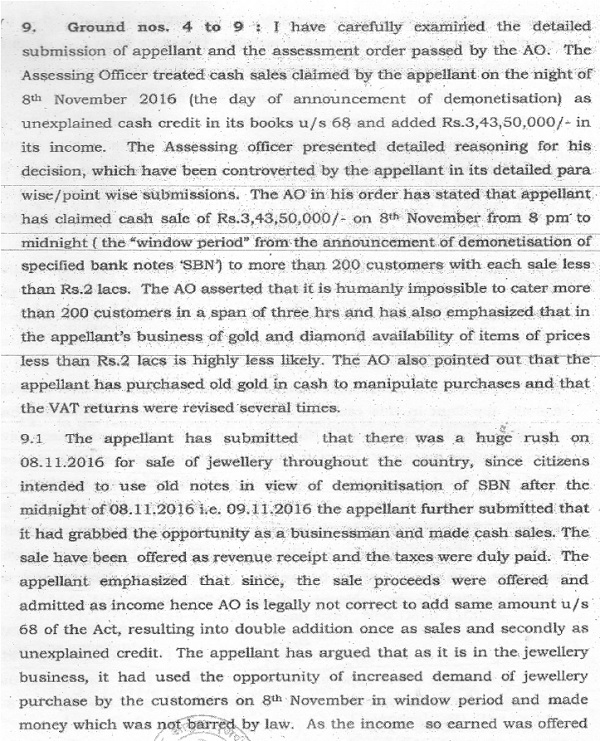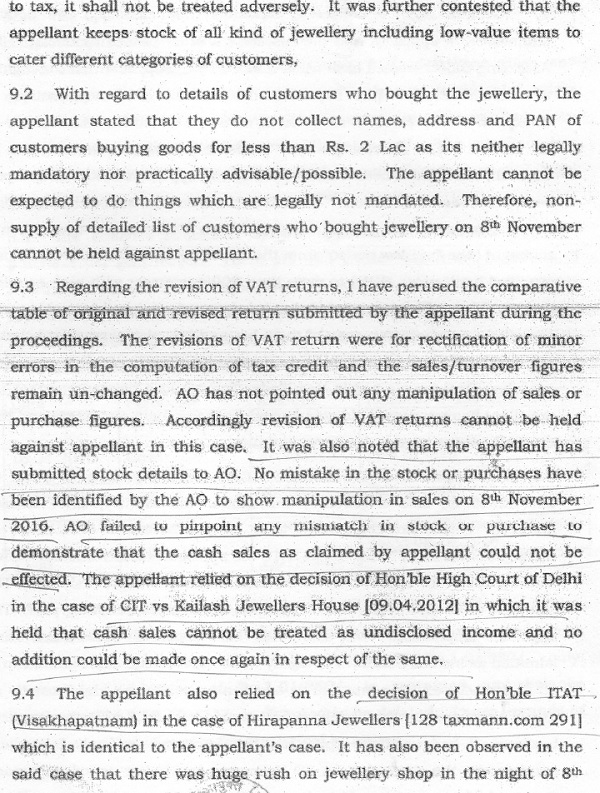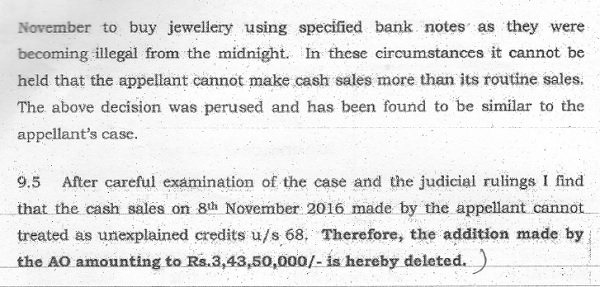Case Law Details
DCIT Vs Manuvel Malabar Jewellers Pvt. Ltd. (ITAT Delhi)
ITAT Delhi held that the cash deposited out of sales cannot be treated as income u/s 68 of the Income Tax Act once the sales are not disputed by the revenue.
Facts- The assessee is a private limited company engaged in retail trading of gold and diamond jewellery operating from rented premises at Sarojini Nagar Market, New Delhi during the year under consideration. The modus operandi adopted by the assessee in its business is that it used to buy stock for trading from registered dealers and make payments through account payee cheques. It also used to buy used old jewellery from its customers mostly as exchange against sale and also against outright payment.
AO observed that the assessee could not provide complete details of purchasers and sellers i.e name, address, PAN etc in respect of parties from whom old gold was purchased and new gold was sold. The AO also observed that the assessee had cash purchases of old gold to the tune of Rs 2,51,70,461 and disallowed the same u/s. 40A(3) of the Act.
Further, during demonetization period, the assessee made cash deposits of Rs. 3,43,50,000. AO disbelieved the explanations offered by the assessee and proceeded to treat the cash deposits of Rs 3,43,50,000/- as unexplained cash credit u/s 68 read with section 115BBE of the Act. 2016.
Conclusion- Hon’ble Jurisdictional High Court in the case of CIT vs Kailash Jewellery House held that the cash deposited out of sales cannot be treated as income u/s 68 of the Act once the sales are not disputed by the revenue.
Held that as long as existence of stocks with the assessee is not doubted by the ld. AO and cash sales made by the assessee is accepted by the ld. AO, in our considered opinion, the entire cash deposits made during the period 09.11.2016 to 31.12.2016 in the sum of Rs 3,43,50,000/-stands duly explained and there is no case for making any addition u/s 68 read with section 115BBE of the Act.
FULL TEXT OF THE ORDER OF ITAT DELHI
This appeal in ITA No.1011/Del/2022 for AY 2017-18, arises out of the order of the Commissioner of Income Tax (Appeals)-30, Delhi [hereinafter referred to as ‘ld. CIT(A)’, in short] in Appeal No.10907/2019-20 dated 18.01.2022 against the order of assessment passed u/s 143(3) of the Income- tax Act, 1961 (hereinafter referred to as ‘the Act’) dated 21.12.2019 by the Income-tax Officer, Ward 16(3), Delhi (hereinafter referred to as ‘ld. AO’).
2. At the outset, there is a delay in filing of appeal by the revenue by 2 days. Considering the smallness of the delay , we are inclined to condone the delay and admit the appeal of the revenue for adjudication.
3. The revenue has raised the following grounds of appeal before us :-
“1. The order of Ld. CIT(A) is not correct in law and facts.
2. That on the facts and circumstances of the case, Ld. CIT(A) has erred in deleting addition of Rs. 3,43,50,000/- made by AO on account o f unexplained cash credit u/s 68 r.w.s. 115 BBE of the Income Tax Act, 1961.
3. That the Ld CIT(A) has erred in ignoring the analysis of month-wise sales during the period F Y 2015-16 and F Y 2016-17. During the month o f November, 2016, the assessee has declared Cash Sales of Rs.3,44,86,905/-whereas in the corresponding period of November, 2015, the assessee declared Cash Sales of Rs 60,32,556/-. The steep jump in sales within a little span of time i.e. just before demonetization period stands unexplained. Moreover, customer details to whom such sales were made also stand unverified.
4. Whether the learned CIT(A) erred in holding, that he purchases of old gold was adjusted against sales made to the very same person, when neither the name and address of the parties from whom old gold was purchased was produced nor any evidence to show how the same was set off against any disclosed sales.
5. Whether the Ld. CIT(A) erred in accepting the genuineness of the purchases of old gold when neither the identity of the parties was established nor any stock records were maintained wrt the old gold purchases.
6. That the appellant craves leave to add, alter, amend or vary any o f the ground either at or before the hearing ”
4. We have heard the rival submissions and perused the materials available on record. The assessee is a private limited company engaged in retail trading of gold and diamond jewellery operating from a rented premises at Sarojini Nagar Market, New Delhi during the year under consideration. The modus operandi adopted by the assessee in its business is that it used to buy stock for trading from registered dealers and make payments through account payee cheques. It also used to buy used old jewellery from its customers mostly as exchange against sale and also against outright payment. The return of income for the Asst Year 2017-18 was filed by the assessee company on 30.10.2017 declaring total income of Rs 9,40,380/-. The ld. AO observed that the assessee could not provide complete details of purchasers and sellers i.e name, address, PAN etc in respect of parties from whom old gold was purchased and new gold was sold. The ld. AO also observed that the assessee had cash purchases of old gold to the tune of Rs 2,51,70,461/- and disallowed the same u/s 40A(3) of the Act in the assessment. The list of parties from to whom those payments are made are listed out in pages 4 to 14 of the assessment order.
5. During the demonetization period between 09.11.2016 to 31.12.2016, the assessee made cash deposits of Rs 3,43,50,000/- as follows:-
| Deposit in South Indian Bank | – Rs 1,90,76,000/- |
| Deposit in Yes Bank | – Rs 1,52,74,000/- |
| Total | – Rs 3,43,50,000/- |
5.1. The assessee vide questionnaire dated 26.08.2019 was asked to explain the cash deposits made during demonetization period and also directed to furnish details of sales, purchases made, cash book and supporting documents. The ld. AO observed that assessee filed partial reply to the same. Notice u/s 133(6) of the Act was issued by the ld. AO to the bank calling for bank statements of the assessee. Based on the replies furnished by the banks u/s 133(6) of the Act, the ld. AO tabulated the dates on which various cash deposits were made in both the banks in page 18 of the assessment order. The assessee was asked to explain the source of those cash deposits made during demonetization period. The assessee replied that the cash deposits were sourced out of cash sale collection, advance received from customers and available cash in hand. The assessee also replied that pursuant to the demonetization announced by the Government of India, it seized the business opportunity to make huge cash sales in the night of 8th November 2016 but did not provide details of customers or their PAN by stating that the personal details of retail customers are to be collected only when the cash sale invoice exceeded the specified threshold and that all the cash sales were made on 8th Nov 2016 below the threshold limit, there was no obligation for the assessee to collect the personal details. The assessee explained by way of cash book and details of cash sales that as many as 211 customers were entertained on 8th Nov 2016 as under:-
a) 67 customers had bought items with sale value less than Rs 1.20 lacs per bill which also included 11 customers whose average billing was less than Rs 50,000/-
b) 121 customers bought items with sale value less than Rs 1.70 lacs per bill but above Rs 1.20 lacs per bill
c) remaining 23 sale bills had sale value less than Rs 2 lacs per bill but above Rs 1.70 lacs per bill.
6. Pursuant to the aforesaid sales made on 08.11.2016, significant amount of cash was generated from sales which were in turn deposited in bank commencing from 09.11.2016 to 31.12.2016. The ld. AO called for stock details vide point no. 19 in the questionnaire dated 21.11.2019 as under:-
“The details of opening stock as on 7th November , 2016, sales made on 8th November, 2016, 9th November , 2016 and onwards may be filed separately.”
7. This query was duly replied by the assessee vide point no. 10 in the submission dated 06.12.2019 by furnishing the details of availability of stock as on 8th November 2016 as well as item wise recording of each of the sales in the stock register.
8. The ld. AO observed that it is highly improbable for any assessee to make sales to 211 customers within the small gap of 4 hours on 8th November 2016 and this when compared to the past history of the assessee, there were hardly not more than 100 entries of sales in a single day. Even during the festival season of Diwali (where it is usual practice to buy jewellery as a custom followed by Hindus), the assessee had only 78 sale entries in its sales book. Accordingly, the ld. AO concluded that the cash book was maintained by the assessee only after depositing of cash or after receiving notice u/s 143(2) of the Act. The ld. AO also observed that all cash sales made were just less than Rs 2,00,000/- and called for details of name, address, PAN and complete details of customers to whom sales were made and full details of entities from whom purchases were made from the assessee. The ld. AO observed that assessee denied to provide name, address, PAN and other complete details of customers who purchased jewellery from the assessee company and also denied to provide information of purchases made. The ld. AO also observed that purchases were fabricated by mentioning that old gold was purchased which are not evidenced with any supporting bills/ vouchers. The ld. AO also observed that month wise sales and purchases for the period 01.04.2016 to 31.03.2017 shows there was steep increase in sales during the month of November 2016 at Rs 3.44 crores but no supporting evidence of customers to whom sales have been made was furnished. The ld. AO also compared the cash sales made in the corresponding period in earlier year and noticed that there was steep increase in cash sales in November 2016 The ld. AO also observed that VAT returns for the financial year 2016-17 was called for and examined and there were some discrepancies seen in the turnover as per ITR and VAT return in the quarterly return filed. The ld. AO also noticed that assessee had revised the VAT returns for all the 4 quarters after the announcement of demonetization. The assessee also explained the said discrepancy before the ld. AO by stating that there were over reporting of sales in first two quarters and under reporting in third quarter, having a net effect of over reporting of Rs 1.06 lacs in the Tax return as compared to accounts. Tax effect of the same was negligible and hence returns were not revised, more particularly because GST was launched in next year. With these observations, the ld. AO disbelieved the explanations offered by the assessee and proceeded to treat the cash deposits of Rs 3,43,50,000/- as unexplained cash credit u/s 68 read with section 115BBE of the Act. 2016 The assessee met each and every averment of the ld. AO before the ld. CIT(A) with regard to disallowance of purchases made u/s 40A(3) of the Act as well as for cash deposits u/s 68 read with section 115BBE of the Act. With regard to cash purchases disallowance made by the ld. AO u/s 40A(3) of the Act, the assessee pointed out before the ld. CIT(A) that the ld. AO selected 428 entries from the ledger account of “purchases old gold” and without raising any questions on the assessee regarding the mode of payment thereon, assumed that all those 428 entries were payments in cash, whereas factually the cash payments in excess of Rs 20,000/- was only Rs 1,01,057/-. The assessee provided the details for the same before the ld. CIT(A). The ld. CIT(A) examined the same and deleted the disallowance u/s 40A(3) of the Act. Against this deletion, the revenue is not in appeal before us.
10. With regard to the addition made in the sum of Rs 3,43,50,000/- u/s 68 read with section 115BBE of the Act, the ld. CIT(A) granted relief to the assessee by observing as under:-



11. We find that the ld. AO had called for stock details from the assessee as on 8th November 2016 which were duly furnished by the assessee vide point no. 10 in the submission dated 06.12.2019 by furnishing the details of availability of stock as on 8th November 2016 as well as item wise recording of each of the sales in the stock register. We find that the assessee had duly furnished the complete stock summary as on 08.11.2016 showing complete details of Gold Raw Material Goods, Finished Goods, Work in Progress, Stock in Trade, Old stocks available etc. The assessee had also furnished the complete stock details of old diamond item wise for the period 06.11.2016 to 31.12.2016 ; 22 carat gold stock for the period 06.11.2016 to 31.12.2016 ; diamond jewellery bought item wise for the period 06.11.2016 to 31.12.2016 ; Gold 18 carat bought item wise for the period 06.11.2016 to 31.12.2016 ; Silver stock item wise for the period 06.11.2016 to 31.12.2016. The said details contained movement of stocks and sales made both in cash and credit card. These details are enclosed in pages 174 to 197 of the paper book. The ld. AO after collecting this information neither found any fault with inventory records, nor raised any further queries. It is pertinent to note that cash book of the assessee was accepted by the ld. AO, stock registers were accepted by the ld. AO and cash sales reported by the assessee were also accepted by the ld. AO. We find that the assessee had duly proved the fact of corresponding reduction in stock to the extent of cash sales made by it on 8th November 2016. We are unable to appreciate the observation made by the ld. AO in para 8 of his order that cash book was prepared by the assessee only after receipt of notice u/s 143(2) of the Act. In the instant case, the notice u/s 143(2) of the Act was issued on 24.09.2018. Whereas in the return of income filed by the assessee on 30.10.2017 itself, the assessee had disclosed cash sales made on 8th November 2016 and included the same in the cash book and the entire cash book was duly placed before the statutory and tax auditors of the assessee company and return filed after due conduct of audit thereon. As stated earlier, no discrepancies whatsoever were found by the ld. AO in the cash book, stock registers, sales book etc except entertaining suspicion in his mind with a pre-conceived notion in order to reach a pre-determined destination. Moreover, we find that the assessee had made a categorical submission that it had not entertained receipt of cash in specified bank notes from 9th November 2016 onwards from any customers due to the ban announced by the Government. This fact has not been controverted by the revenue. Effectively, the assessee had only recorded huge cash sales and cash advance received from customers on 8th November 2016 in demonetized currency (as the said currency was valid upto 12 AM of 8th November 2016) and had merely deposited the same thereafter. For the cash sales made by the assessee on 8th November 2016, the assessee had sufficient stocks of gold and diamond with it and had duly reduced the stocks in the stock register to the extent of sales made. There is nothing wrong on the business behavior of the assessee trying to seize the business opportunity of making huge cash sales on 8th November 2016. What is required and relevant is that assessee should have sufficient stocks in its kitty to effectuate the sales. As long as existence of stocks with the assessee is not doubted by the ld. AO and cash sales made by the assessee is accepted by the ld. AO, in our considered opinion, the entire cash deposits made during the period 09.11.2016 to 31.12.2016 in the sum of Rs 3,43,50,000/-stands duly explained and there is no case for making any addition u/s 68 read with section 115BBE of the Act. We find that similar issue was also considered by the Hon’ble Jurisdictional High Court in the case of CIT vs Kailash Jewellery House in ITA 613/2010 wherein it was held that the cash deposited out of sales cannot be treated as income u/s 68 of the Act once the sales are not disputed by the revenue. Similarly in the context of cash deposits made during demonetization period, the co-ordinate bench of Vizag Tribunal in the case of Hirapanna Jewellers reported in 128 taxmann.com 291 had decided the issue in favour of the assessee. The ld. CIT(A) had duly appreciated these factual and legal contentions of the assessee and granted relief to the assessee, on which we do not find any infirmity. The relevant operative portion of the order of the ld. CIT(A) had already been reproduced supra.
12. In view of the aforesaid observations and respectfully following the judicial precedents relied upon hereinabove, we do not deem it fit to interfere in the order of the ld. CIT(A) and accordingly, the grounds raised by the revenue are dismissed.
13. In the result, the appeal of the revenue is dismissed.
Order pronounced in the open court on 18.08.2023.




